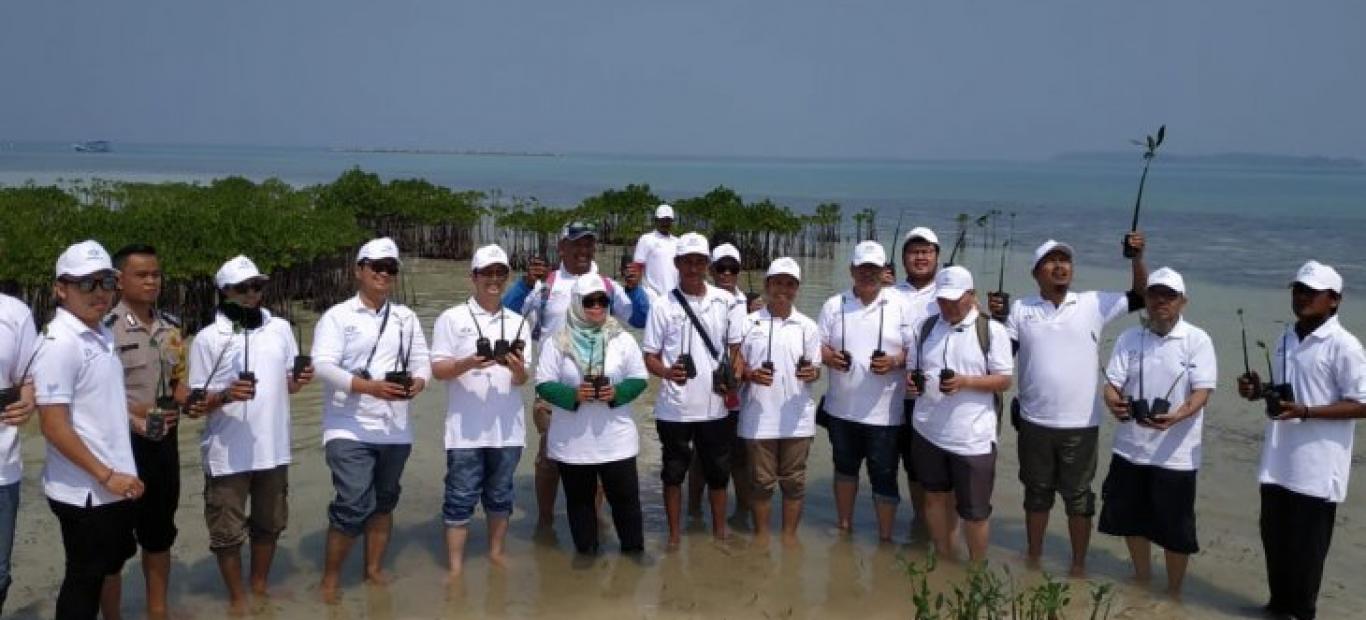News

Supporting the nature conservation of the Thousand Islands, Indonesia Re plants mangroves and transplant coral reefs

Jakarta (ANTARA) - State-owned reinsurance company, Indonesia Re, held an environmental activity with the theme "Indonesia Re Cares for the Environment" which was held on Panggang Island, Thousand Islands, Saturday, July 13th 2019.
Corporate Secretary Division Head Indonesia Re, Novis Asria, said that environmental care activities were carried out as a form of contribution to the environment and society as well as introducing Indonesia Re to the public.
"Through this activity, we run programs as a form of our service and at the same time introduce Indonesia Re to the public, especially in Panggang Island," he said.
This is the second year Indonesia Re has held environmental activities on Panggang Island. In the previous year, on the same island, Indonesia Re provided grouper seeds and planted mangroves to help preserve the flora and fauna in the area.
Watching the developments in the previous program, Indonesia Re is increasingly optimistic to continue to contribute to developing the marine environment and the community on Panggang Island.
"After seeing the development and enthusiasm of the community in the previous program, we are optimistic to continue to contribute to developing the potential of the marine environment and the people on this island," added Novis.
In this second year, Indonesia Re is planting more mangroves on the beach, transplanting coral reefs, and to support the local community's economy, a floating house will be built as a diving activity center for tourists visiting Panggang Island.
The head of the Thousand Islands, Marine National Park Office, Badiah, expressed his appreciation for the initiative of Indonesia Re in helping to preserve the environment of Panggang Island.
"We are very happy and support the programs carried out by Indonesia Re to restore the ecosystem here," continued Badiah.
He hopes that with this activity, Panggang Island, which is included in the National Tourism Strategic Area (KSPN), can be integrated and become a tourist destination for local and foreign tourists.
"Restoration of the environment in a natural way, such as planting mangroves and coral reefs, is what we are currently developing and has proven to be more sustainable than those that are temporary and artificial," he explained.
Corporate Secretary Division Head Indonesia Re, Novis Asria, said that environmental care activities were carried out as a form of contribution to the environment and society as well as introducing Indonesia Re to the public.
"Through this activity, we run programs as a form of our service and at the same time introduce Indonesia Re to the public, especially in Panggang Island," he said.
This is the second year Indonesia Re has held environmental activities on Panggang Island. In the previous year, on the same island, Indonesia Re provided grouper seeds and planted mangroves to help preserve the flora and fauna in the area.
Watching the developments in the previous program, Indonesia Re is increasingly optimistic to continue to contribute to developing the marine environment and the community on Panggang Island.
"After seeing the development and enthusiasm of the community in the previous program, we are optimistic to continue to contribute to developing the potential of the marine environment and the people on this island," added Novis.
In this second year, Indonesia Re is planting more mangroves on the beach, transplanting coral reefs, and to support the local community's economy, a floating house will be built as a diving activity center for tourists visiting Panggang Island.
The head of the Thousand Islands, Marine National Park Office, Badiah, expressed his appreciation for the initiative of Indonesia Re in helping to preserve the environment of Panggang Island.
"We are very happy and support the programs carried out by Indonesia Re to restore the ecosystem here," continued Badiah.
He hopes that with this activity, Panggang Island, which is included in the National Tourism Strategic Area (KSPN), can be integrated and become a tourist destination for local and foreign tourists.
"Restoration of the environment in a natural way, such as planting mangroves and coral reefs, is what we are currently developing and has proven to be more sustainable than those that are temporary and artificial," he explained.
Source : Antara




 2431
2431









